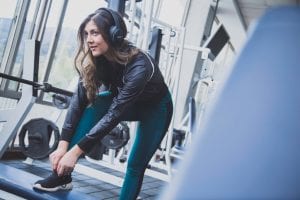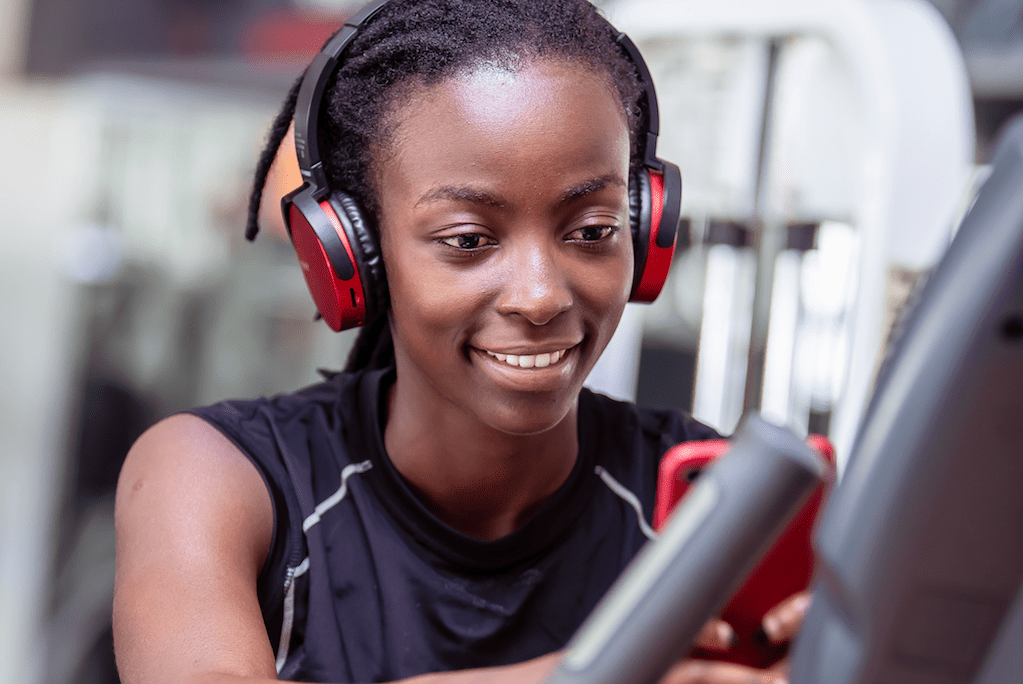Skift Take
Exercise, yoga, and meditation are surging in popularity, but consumers are as time-crunched as ever. It’s no wonder that the audio-based fitness brand Aaptiv (yes, there’s an app for that) has taken off.
 The Skift Wellness newsletter is our weekly dispatch focused on what’s happening in wellness from a global business standpoint. Skift Wellness lives where wellness meets commerce, mindfulness meets technology, the yoga studio meets the boardroom, and health meets business.
The Skift Wellness newsletter is our weekly dispatch focused on what’s happening in wellness from a global business standpoint. Skift Wellness lives where wellness meets commerce, mindfulness meets technology, the yoga studio meets the boardroom, and health meets business.
In a way, meeting up with friends to take a workout class followed by a trip to a matcha cafe has become the new bar scene, much to the alcohol industry’s chagrin. This is especially true as fewer millennials drink, compared to their parents or older siblings. Mix in a desire among millennials for self-improvement and self-care, and it’s easy to see why business is booming for ClassPass and boutique fitness studios.
Still, there are nights when you work late, can’t bring yourself to leave the house, or just want a solo exercise session. That’s where Aaptiv comes in. Aaptiv is an on-demand audio fitness app that’s had big success since launching three years ago. The company is now going global, spreading to 20 countries, with localized editions becoming available in 2019.
It’s not a war of audio versus visual. Just as podcasts can coexist with Netflix, audio-led workouts can thrive alongside screen-based brands (we’re looking at you, Peloton). What will challenge the company, said CEO Ethan Agarwal, is adapting the app to each individual country. “There’s such significantly different cultural elements across different countries as related to fitness,” he told Fast Company.
Speaking of self-care crossing cultures, WTHN, a new acupuncture boutique, launched in New York City with plans to expand nationwide. The goal is to make the traditional Chinese medicine practice of acupuncture an “affordable luxury” (as Squeeze, Drybar’s new massage concept, hopes to do in the massage space).
The launch clearly comes at a good time, as more people practice yoga and meditate than ever before. Now for the logical next question: Can it scale fast enough?
For feedback or news tips, reach out via email at [email protected] or tweet me @lesliebarrie.
— Leslie Barrie, Skift Wellness Editor
Technology
 Aaptiv Goes Global, Showing On-Demand Fitness Is Pulling No Punches: Sure, screen-based workouts are popular, but Aaptiv’s success illustrates that there’s a huge market for audio-led workouts, too. Known as the “Spotify of Fitness,” the three-year-old company currently features 2,500 audio workouts in categories from running and boxing to cycling and yoga, and 30,000 classes are taken by its 200,000 users each day. The company just announced it’s expanding to 20 countries, including France, Spain, Mexico, and India. Whether other nations will get on board remains an open question.
Aaptiv Goes Global, Showing On-Demand Fitness Is Pulling No Punches: Sure, screen-based workouts are popular, but Aaptiv’s success illustrates that there’s a huge market for audio-led workouts, too. Known as the “Spotify of Fitness,” the three-year-old company currently features 2,500 audio workouts in categories from running and boxing to cycling and yoga, and 30,000 classes are taken by its 200,000 users each day. The company just announced it’s expanding to 20 countries, including France, Spain, Mexico, and India. Whether other nations will get on board remains an open question.
Mind & Body
Acupuncture Goes Mainstream With the Launch of WTHN: It was only a matter of time before the ancient tradition of acupuncture would get a 2018 makeover. Enter WTHN (pronounced “within”), a sleek studio space designed to target customers who want affordable luxury –– those who aren’t looking for a high-end spa, nor a clinical setting for their regular acupuncture pricks. The goal is simple booking and a clear “menu” of offerings, so people can easily drop in for on-demand self-care — something WTHN is wise to get in on.
Yoga Is Up 55 Percent in America Since 2012, Proving Zen Is In: Meditation, too, is seeing a surge –– the number of Americans who take mental breaks has tripled in that same time frame, according to the Centers for Disease Control and Prevention (CDC). Why the uptick? It’s not just that it’s easier to find a studio or an app to download. People now, more than ever, want alternative remedies rather than medications to get a better handle on anxiety or other mental health issues. Smart companies will continue to capitalize on these mind-body trends. Clearly, the audience isn’t going anywhere in this stressed-out climate.
Travel
The Rise of the Women-Only Wellness Retreat: First we heard about SuperShe, the uber-elite female-only networking and well-being retreat (the founder, German-American entrepreneur Kristina Roth, actually bought a private island to host the events — no big deal). Now, Escapada, a health retreat brand launched in 2017, is kick-starting its own version of women-only wellness travel in 2019, with a focus on women going through transitional phases of their lives — from fertility issues to insomnia, menopause, or relationships. Our bet is that this is only the beginning of women-targeted well-being excursions.
Food & Drink
Unilever Gets In on the Better-For-You Dessert Trend: Ice cream and “frozen novelties” accounted for a staggering $12 billion in sales last year, proving that chilly treats mean big business. While legacy brands Nestle and Unilever still dominate, innovation like “healthier” pints (hello Yasso, Halo Top, and Arctic Zero) are fueling the growth. So it makes sense that Unilever would launch Culture Republick, a probiotic-infused, high-protein ice cream for which 10 percent of earnings goes to artist foundations. It’s the company’s first new brand in 16 years. Whether customers will want a scoop is the real test.
Athleisure
Inside Under Armour’s Toxic Work Culture: The sports apparel company is known for its stretchy, moisture-wicking base layers — and now this. A memo went out back in February addressing the brand’s widespread strip club problem, alerting executives that they could no longer expense “adult entertainment, limousine services, and gambling.” The brand is also under fire for sexist workplace practices, including executives inviting young female employees to parties based on their attractiveness. Will word of this inappropriate office culture affect sales? It depends on whether or not the company can really fix these issues.
SLEEP
Yep, There’s Now A Boutique Studio for Napping: You’ve likely heard that Silicon Valley giants like Uber and Google have nap pods in their offices, so employees can recharge between meetings. But if you work for a company that doesn’t offer the wellness perk (so pretty much the rest of us), there’s a hack for that. For a $250 monthly subscription (or $15 per half-hour snooze session), customers can visit Nap York, a so-called “napping lounge,” up to five times a week. It’s a steep price, but a clever way to tap into the growing sleeping economy. Time will tell if the company’s dream takes off.
Skift Wellness Editor Leslie Barrie [[email protected]] curates the Skift Wellness newsletter. Skift emails the newsletter every Thursday.
The Daily Newsletter
Our daily coverage of the global travel industry. Written by editors and analysts from across Skift’s brands.
Have a confidential tip for Skift? Get in touch
Tags: Skift Wellness, wellness
Photo credit: A woman is shown at the gym with headphones. Aaptiv, an on-demand audio fitness app, recently announce that it's expanding globally to 20 countries. @modan255 / Unsplash
